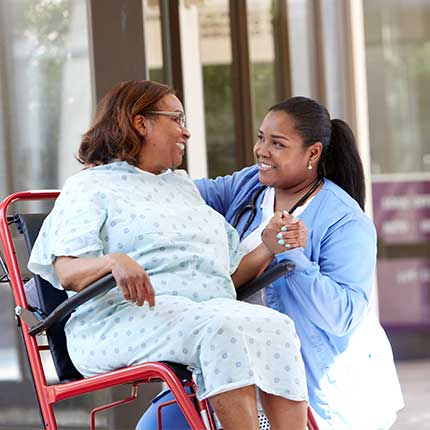Crain's Health Care Heroes: Teena Chopra, M.D., Director of Infection Prevention and Hospital Epidemiology
Jun 2, 2021For medical professionals, managing the novel coronavirus meant learning on the go and adapting protocols to treat the disease and prevent its spread as new research emerged.
 It also called on some physicians to take on a new role and help explain COVID-19 to an anxious and uncertain public.
It also called on some physicians to take on a new role and help explain COVID-19 to an anxious and uncertain public.
Day after day as the pandemic surged through their hospitals, Drs. Nick Gilpin, Teena Chopra and Adnan Munkarah stayed strong, making rounds, leading response efforts and talking with the media and the public about what was happening.
Gilpin, system director of infection prevention and epidemiology of eight-hospital Beaumont Health, explained what coronavirus was and recommended precautions including masks, social distancing and frequent hand washing. He emphasized how dangerous the virus was for patients and how challenging it was for doctors, nurses and health care workers.
Chopra, director of infection prevention and hospital epidemiology at six-hospital Detroit Medical Center, told us about the hospitalizations, the sickness and deaths of patients, how families and friends were separated from loved ones for public safety reasons, sometimes during their last hours.
Munkarah, chief clinical officer at six-hospital Henry Ford Health System, talked about the importance of testing and the safety and effectiveness of vaccinations. He encouraged the public to get a vaccine as soon as possible for personal protection, but also as a way to slow community spread of the virus.
All three did what they could to get the message out that COVID-19 was dangerous but there were things people could do to minimize risk. Sometimes their outspokenness was ahead of the political curve. However, they felt confident because they believed their opinions were based on medicine and science.
At DMC, Chopra was one of the first in Michigan to call attention to the rising numbers of seniors being admitted from nursing homes.
“I was able to spread the word that the mortalities are being driven by nursing homes,” said Chopra, who also is a professor of infectious disease at Wayne State University School of Medicine.
“We realized that is where we should put our attention and were able to save a lot of lives,” Chopra said, adding that DMC worked with other hospitals, the Detroit Health Department and state officials to coordinate efforts.
Chopra also worked with DMC's leadership team to develop treatments, testing initiatives and infection prevention protocols to safeguard staff and patients.
It was a challenge Chopra, who has lived in Detroit for 16 years, had been prepared for her whole life.
“I come from a family of physicians and professors. My grandfather, Dr. Harnam Singh, who planted the seed in my head to become a physician, was a public health doctor” who fought a cholera pandemic in India during the early 1940s, Chopra said.
“I grew up listening to those stories and I always wanted to be able to serve,” she said.
Early in the pandemic, Chopra's mother, Manjit Chopra, happened to come to Detroit from India for her annual visit.
“She landed March 10 and that night was the first two cases that appeared in Michigan. Since then, she has been here” helping take care of her 7-year-old daughter, Chopra said.
“She's a retired professor and she loves to volunteer. She has been helping me out a lot with my work-life balance,” Chopra said.
When talking with the media, Chopra also often spoke out about the importance of COVID-19 precautions.
“Very early in March, DMC began to mandate masks, even before the CDC. We knew this is a respiratory and a very contagious virus, and were in this for the long haul,” she said.
Chopra learned several lessons from the pandemic she hopes health care leaders and people remember.
“The biggest lesson for me is counting our blessings and being grateful. We live here in the U.S. in a very developed country, but in India, what is happening (with record numbers of COVID-19 and deaths) is beyond words,” she said. “We are all in this together.”
Chopra said hospitals and government need to be better prepared for the next pandemic.
“The pandemic is not over yet. The virus has mutated and there are variants out there,” she said. “That's why we are raising funds to create a pandemic preparedness center so we can do a better job, when it comes to testing, vaccination or dealing with the bigger problems of health care for different populations.”



